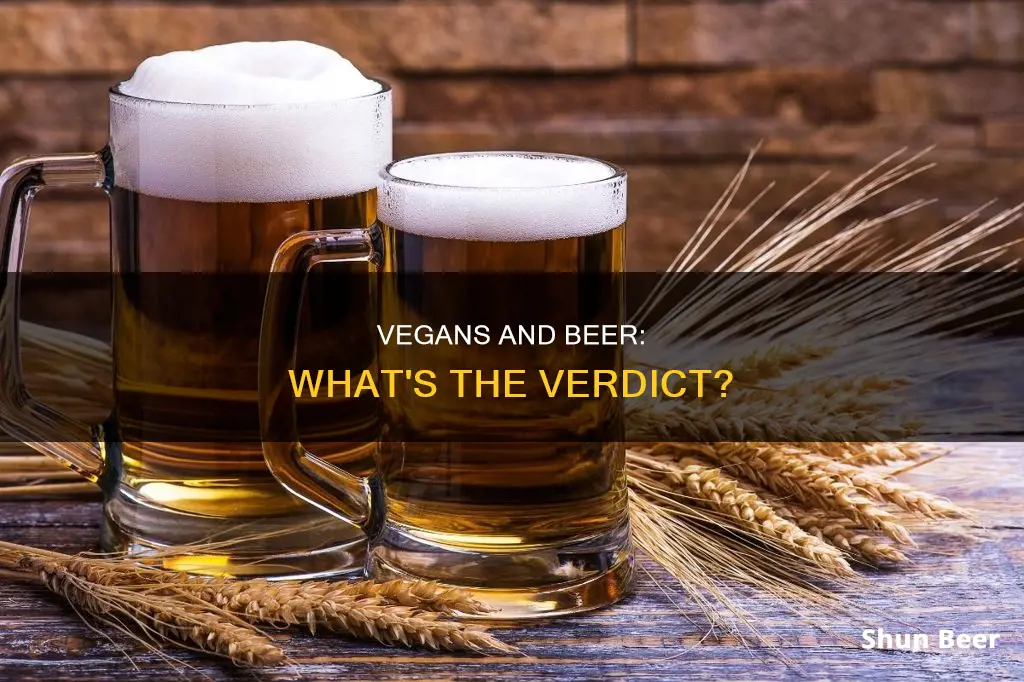
Beer is usually vegan-friendly because it's typically made from barley malt, water, hops, and yeast — none of which are derived from animal sources. However, some breweries add extra ingredients to their beer, such as honey, lactose, or isinglass, which are animal products. These extra ingredients are not always disclosed on the label, so it can be hard to tell whether a beer is vegan-friendly or not. Some resources, like Barnivore, can help identify which beers are suitable for vegans.
What You'll Learn

Beer is usually vegan-friendly
However, additional flavourings may be used, such as dairy products (e.g. lactose in milk stouts) or honey, which are not vegan. Brewers are not required to disclose ingredient lists on the label, so it can be difficult to know if a beer is vegan-friendly. Some breweries, such as Guinness, have made their beers vegan-friendly, but it is always good to check.
Some beers also use products derived from animals for filtration, which are called finings. These can include animal-derived products like isinglass (a form of collagen derived from the dried swim bladders of fish), gelatin, egg whites, and sea shells. Most beer is filtered without the need for animal products, but some British cask ales are traditionally served unfiltered, and may use isinglass as a fining agent.
To identify vegan-friendly beers, you can use online resources such as Barnivore, which is a web-based database that provides information on ingredients and filtering methods used in alcoholic beverages. There are also mobile applications available, such as Vegaholic and VeggieBeers, that can help identify vegan-friendly beers.
Drinking Beer at Long Branch: What You Need to Know
You may want to see also

Some brewers add non-vegan ingredients
While the basic ingredients in beer are vegan-friendly, some brewers add non-vegan ingredients to the beer to clarify, flavour, or colour it. These ingredients are not always listed on the label, and brewers are not required to disclose them.
One of the most common non-vegan ingredients added to beer is isinglass, a form of collagen derived from the dried swim bladders of fish, which is used to clarify the beer. Other animal-derived finings that may be used include gelatin, egg whites, and shellfish.
Some beers also contain dairy products, such as lactose in milk stouts, or honey, which is used as a sweetener. While these ingredients are generally considered suitable for vegetarians, they are not vegan-friendly.
It is important to note that some breweries do produce vegan beers, and there are resources available, such as the Barnivore website and associated mobile applications, that can help identify vegan-friendly alcoholic beverages.
Beer and Crohn's: What's Safe to Drink?
You may want to see also

Finings can be plant or animal-derived
Beer is often made from barley malt, water, hops, and yeast, and so it is usually suitable for vegetarians and vegans. However, some brewers add finings to clarify the beer when racking it into a barrel. Finings can be plant or animal-derived.
Plant-derived finings include Irish moss and pectin. Animal-derived finings include isinglass, gelatin, egg whites, and sea shells. Isinglass is the most common fining used to clear cask ale. It is produced from the swim bladders of fish, usually sturgeon, and is therefore not considered vegetarian.
Brewers are not required to disclose the finings they use, so choosing a vegetarian-friendly brewery or beverage known to contain no animal products is essential for those who want to avoid animal-derived finings.
Beer and Tetanus Shots: What You Need to Know
You may want to see also

Brewers aren't required to disclose ingredients
In general, beer is made from barley malt, yeast, hops, and water. These ingredients contain no animal products, making beer both vegetarian and vegan-friendly. However, some breweries use additives in their beers for flavour or filtration that are derived from animal sources. These additives can include dairy products, such as lactose in milk stouts, or honey, which is used as a sweetener. While these ingredients are usually considered suitable for vegetarians, they are not vegan-friendly.
Brewers are not required to disclose ingredient lists on their labels. Most breweries do not reveal if they do or do not use animal products in the processing of their beers. This makes it difficult for consumers to know whether the beer they are drinking contains animal products.
In 2016, the Beer Institute announced the Brewers' Voluntary Disclosure Initiative, encouraging brewers and importers to voluntarily include a serving facts statement, freshness dating, and disclose ingredients on either the label or secondary packaging. This initiative was a step towards providing consumers with more transparency and meaningful information about the beverages they consume. Despite this initiative, disclosing ingredients remains voluntary, and many brewers may choose not to do so.
Some brewers have started to disclose their ingredients due to consumer advocacy and pressure from groups such as the Center for Science in the Public Interest. In 2014, food activist Vani Hari, also known as "The Food Babe," launched an online campaign urging major brewers Anheuser-Busch InBev and MillerCoors to disclose their ingredients. As a result, these companies agreed to disclose information about the ingredients used in their most popular brands.
While some brewers are moving towards greater transparency, it is not a legal requirement. As alcoholic products are regulated by the Alcohol and Tobacco Tax and Trade Bureau (TTB), they are exempt from the regulations enforced by the U.S. Food & Drug Administration (FDA), which requires food products to disclose nutritional facts and ingredients on their labels. Therefore, it is up to individual brewers to decide whether to disclose their ingredients, and consumers who wish to avoid animal products in their beer may need to do additional research or choose breweries that are known to be vegetarian and vegan-friendly.
LDS and Zero Beer: What's the Verdict?
You may want to see also

There are tools to help identify veg-friendly beers
While most beers are made from barley malt, water, hops and yeast—ingredients that are suitable for vegetarians—some breweries use animal-derived add-ins for flavouring or filtration. These include honey, lactose, and finings such as isinglass, gelatin, egg whites, and sea shells.
Brewers are not required to disclose ingredient lists or finings used on the label, so choosing a vegetarian-friendly brewery or beverage is essential. Fortunately, there are tools to help identify veg-friendly beers.
One such tool is Barnivore, a web-based database that has compiled information on over 45,000 beer, wine, and liquor products, including ingredients and filtering methods used. Barnivore also has associated mobile applications for both iOS and Android devices, such as VeggieBeers, which is free to download and is the highest-rated of the iOS apps that use Barnivore's data.
Another option for identifying vegan beers is to contact the brewer directly and ask them if a particular beer uses any animal ingredients in the manufacturing process. This will provide the most up-to-date answer and signal to the company that there is a growing demand for vegan products.
Minneapolis Park Beer Rules: What You Need to Know
You may want to see also
Frequently asked questions
Yes, vegetarians can drink beer. The basic ingredients in beer are water, a starch source (malted barley, corn, rice, wheat or sugar), a brewer’s yeast, and a flavouring (e.g. hops) – none of which are derived from animal sources.
No. Some breweries use animal products in their beers for flavour or filtration. These include lactose, honey, isinglass, gelatin, glycerol monostearate, egg whites, and sea shells.
Brewers are not required to disclose ingredient lists or fining agents on the label. However, some breweries have published this information and are vegetarian-friendly, including Samuel Smith, Heineken, Harp Lager, Anheuser-Busch, and the Marble Brewery in Manchester. You can also use online resources such as Barnivore, which lists over 44,000 different vegan-friendly alcoholic drinks.
Yes, many popular beers are vegetarian-friendly, including Budweiser, Bud Light, Coors, Corona Extra, Miller Genuine Draft, Guinness, Amstel, Heineken, and many more.







